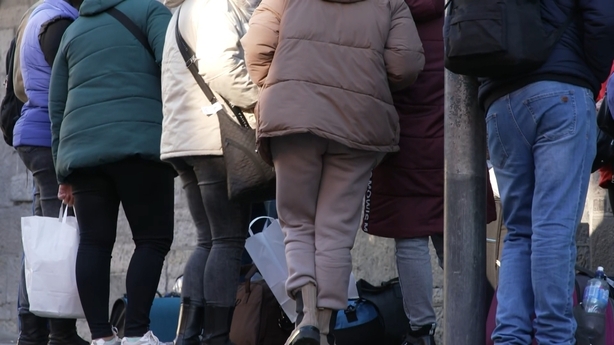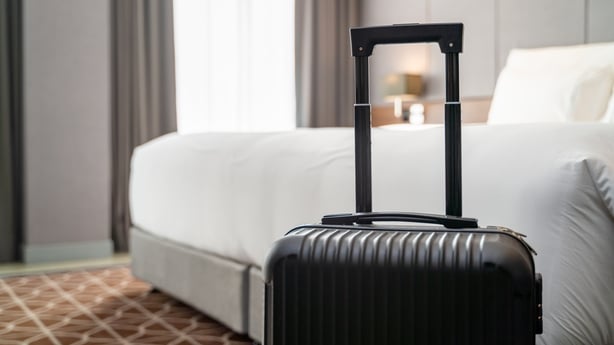Organisations supporting Ukrainian refugees in Ireland have raised concerns about people being evicted from hotel accommodation for leaving without permission.
A spokesperson for the Department of Integration said its accommodation absence policy ensures that the State is "not paying for empty beds" except for "exceptional circumstances".
"The absence protocol was revised in October 2023 but it's really in the last three months that we're seeing it implemented on a zero tolerance basis which means there's no nuance," Emma Lane-Spollen, of the National Coordination of the Ukraine Civil Society Forum, said.
"The Ukrainian people themselves are quite often not aware of what the rules are or that they've broken them and unfortunately the result is quite punitive because they're evicted from their accommodation," Ms Lane-Spollen added.
In October 2023, the Department of Integration suspended a "short-term absence allowance" that allowed Ukrainians living in State-provided accommodation, such as in hotels or guesthouses, to leave for up to seven days in a six-month period.
Now people can only leave for one night or more in "exceptional circumstances" which must be approved by the Department of Integration's Ukraine Crisis Temporary Accommodation Team.
A department spokesperson said unapproved absences are "considered a refusal of emergency accommodation."
However, the department confirmed that a person "may retroactively apply" for approval.
The Ukraine Civil Society Forum is made up of 118 organisations that support Ukrainian refugees in Ireland.
Ms Lane-Spollen said it is their experience that "the bar for getting permission (to leave accommodation) is extremely high".
"So we have a case in one town in the south of Ireland where a woman has lost 20kg in weight waiting for an important operation. She can get it in Ukraine [but] she can't get permission to leave here. She's got a letter from her GP, she's on the waiting list for the HSE ... she cannot get treated here, and they said no. So there's no compassion in that," Ms Lane Spollen said.
According to a spokesperson for the Department of Integration exceptional absence permissions are granted on "a case by case" basis.
They gave examples including: "Hospitalisation and travel abroad for surgery or other specialist medical care" as well as the possible need to return to Ukraine "to care for ailing family members, meet with loved ones on leave from the armed forces of Ukraine and manage other unforeseen personal affairs."
However correspondence refusing approval for a leave request stated that reasons such as "inheritance, registration of property and wills, medical check-ups, medical assessments, dental care or requests to visit a family member for a lengthy period of time are not deemed exceptional absences."
Ukrainians who fail to secure permission to leave are given the option to "relinquish their accommodation" before they travel.

Guidelines state that they "will be entitled to apply for a new offer of accommodation upon their return to Ireland, if accommodation is available" but that there was "no guarantee that the new offer will be of similar quality to the accommodation that was vacated, or that it will be in the same area."
Ms Lane-Spollen said that the Ukraine Civil Society Forum has noted an increase in evictions.
The Department of Integration, when figures were requested from it, said that it "does not collect information regarding how many people have been asked to leave their accommodation following an unsanctioned absence."
"The fact that the Department is not being transparent and sharing those figures is extraordinary because I think it is really really important that we have real data and we're able to make decisions based on the evidence," Ms Lane-Spollen said.
"If a lot of people are applying for real reasons and they are not getting through, where is the transparency and accountability to make sure that those decisions are being fairly and justly and humanely made. That oversight is essential in a democracy and I think that's what we should be asking for," she added.

This year the Government made a number of changes to the accommodation and support offered to those fleeing the war in Ukraine.
On 14 March, the Government moved away from a system of offering accommodation in hotels and guesthouses to new arrivals, placing them instead in "designated accommodation centres" for a maximum of 90 days, after which they have to find their own accommodation.
However those already living in hotels, guesthouses or similar accommodation on 14 March could continue to do so, and this absence protocol applies to them.
We need your consent to load this rte-player contentWe use rte-player to manage extra content that can set cookies on your device and collect data about your activity. Please review their details and accept them to load the content.Manage Preferences
The number of Ukrainian refugees living in this type of accommodation peaked at almost 60,000 in October 2023.
This is the same month that the absence protocol was amended by the Department of Integration and it cited the "constrained supply" of accommodation as the reason for the change.
The number of Ukrainians living in such accommodation has almost halved since, down to 32,114 by 3 November.
A Department of Integration spokesperson said that the current iteration of the absence policy" was part of its measures "to ensure proper governance."
"It provides for only exceptional circumstances whereby the State will pay for empty beds in emergency accommodation when the occupants are absent," they said.
The department has also confirmed that the policy will be temporarily amended to allow people to leave their accommodation over the Christmas period, between 23 December and 8 January.







